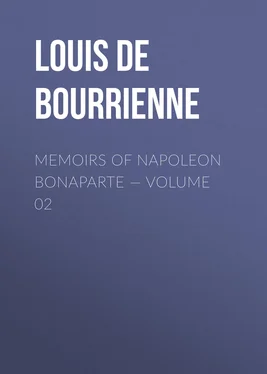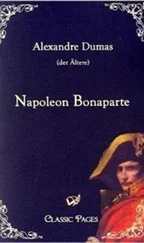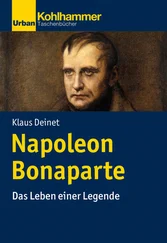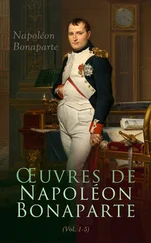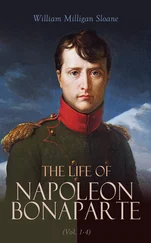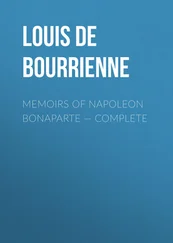Louis Bourrienne - Memoirs of Napoleon Bonaparte — Volume 02
Здесь есть возможность читать онлайн «Louis Bourrienne - Memoirs of Napoleon Bonaparte — Volume 02» — ознакомительный отрывок электронной книги совершенно бесплатно, а после прочтения отрывка купить полную версию. В некоторых случаях можно слушать аудио, скачать через торрент в формате fb2 и присутствует краткое содержание. Жанр: Биографии и Мемуары, История, foreign_edu, foreign_antique, foreign_prose, на английском языке. Описание произведения, (предисловие) а так же отзывы посетителей доступны на портале библиотеки ЛибКат.
- Название:Memoirs of Napoleon Bonaparte — Volume 02
- Автор:
- Жанр:
- Год:неизвестен
- ISBN:нет данных
- Рейтинг книги:3 / 5. Голосов: 1
-
Избранное:Добавить в избранное
- Отзывы:
-
Ваша оценка:
- 60
- 1
- 2
- 3
- 4
- 5
Memoirs of Napoleon Bonaparte — Volume 02: краткое содержание, описание и аннотация
Предлагаем к чтению аннотацию, описание, краткое содержание или предисловие (зависит от того, что написал сам автор книги «Memoirs of Napoleon Bonaparte — Volume 02»). Если вы не нашли необходимую информацию о книге — напишите в комментариях, мы постараемся отыскать её.
Memoirs of Napoleon Bonaparte — Volume 02 — читать онлайн ознакомительный отрывок
Ниже представлен текст книги, разбитый по страницам. Система сохранения места последней прочитанной страницы, позволяет с удобством читать онлайн бесплатно книгу «Memoirs of Napoleon Bonaparte — Volume 02», без необходимости каждый раз заново искать на чём Вы остановились. Поставьте закладку, и сможете в любой момент перейти на страницу, на которой закончили чтение.
Интервал:
Закладка:
Bonaparte also addressed a manifesto to the Doge, which appeared in all the public papers. It contained fifteen articles of complaint, and was followed by a decree ordering the French Minister to leave Venice, the Venetian agents to leave Lombard, and the Lion of St. Mark to be pulled down in all the Continental territories of Venice.
The General-in-Chief now openly manifested his resolution of marching on Paris; and this disposition, which was well known in the army, was soon communicated to Vienna. At this period a letter from the Emperor Francis II. to his brother, the Grand Duke of Tuscany, was intercepted by Bonaparte. I translated the letter, which proved to him that Francis II. was acquainted with his project. He likewise saw with pleasure the assurances which the Emperor gave his brother of his love of peace, as well as the wavering of the imperial resolves, and the incertitude respecting the fate of the Italian princes, which the Emperor easily perceived to depend on Bonaparte. The Emperor's letter was as follows:—
MY DEAR BROTHER—I punctually received your third letter, containing a description of your unhappy and delicate situation. You may be assured that I perceive it as clearly as you do yourself; and I pity you the more because, in truth, I do not know what advice to give you. You are, like me, the victim of the former inactivity of the princes of Italy, who ought, at once, to have acted with all their united forces, while I still possessed Mantua. If Bonaparte's project be, as I learn, to establish republics in Italy, this is likely to end in spreading republicanism over the whole country. I have already commenced negotiations for peace, and the preliminaries are ratified. If the French observe them as strictly as I do, and will do, then your situation will be improved; but already the French are beginning to disregard them. The principal problem which remains to be solved is, whether the French Directory approve of Bonaparte's proceedings, and whether the latter, as appears by some papers distributed through his army, is not disposed to revolt against his country, which also seems to be probable, from his severe conduct towards Switzerland, notwithstanding the assurances of the Directory, that he had been ordered to leave the country untouched. If this should be the case, new and innumerable difficulties may arise. Under these circumstances I can, at present, advise nothing; for, as to myself, it is only time and the circumstances of the moment which can point out how I am to act.
There is nothing new here. We are all well; but the heat is extraordinary. Always retain your friendship and love for me. Make my compliments to your wife, and believe me ever
Your best Friend and Brother, FRANCIS.HETZENDORF, July 20, 1797.
CHAPTER VII
1797.
Unfounded reports—Carnot—Capitulation of Mantua—General Clarke— The Directory yields to Bonaparte—Berthier—Arrival of Eugene Beauharnais at Milan—Comte Delaunay d'Entraigues—His interview with Bonaparte—Seizure of his papers—Copy of one describing a conversation between him and Comte de Montgaillard—The Emperor Francis—The Prince de Conde and General Pichegru.
While Bonaparte was expressing his opinion on his campaigns and the injustice with which they had been criticised, it was generally believed that Carnot dictated to him from a closet in the Luxembourg all the plans of his operations, and that Berthier was at his right hand, without whom, notwithstanding Carnot's plans, which were often mere romances, he would have been greatly embarrassed. This twofold misrepresentation was very current for some time; and, notwithstanding it was contrary to the evidence of facts, it met with much credence, particularly abroad. There was, however, no foundation for the opinion: Let us render to Caesar that which is Caesar's due. Bonaparte was a creator in the art of war, and no imitator. That no man was superior to him in that art is incontestable. At the commencement of the glorious campaign in Italy the Directory certainly sent out instructions to him; but he always followed his own plans, and continually, wrote back that all would be lost if movements conceived at a distance from the scene of action were to be blindly executed. He also offered to resign. At length the Directory perceived the impossibility of prescribing operations of war according to the view of persons in Paris; and when I became the secretary of the General-in- Chief I saw a despatch of the Directory, dated May, 1796, committing the whole plan of the campaign to his judgment; and assuredly there was not a single operation or movement which did not originate with him. Carnot was obliged to yield to his firmness. When the Directory, towards the end of 1796, felt disposed to treat for peace, General Clarke, appointed to conclude the armistice, was authorised, in case Mantua should not be taken before the negotiation was brought to a close, to propose leaving the blockade in statu quo. Had such a condition been adopted it would doubtless have been stipulated that the Emperor of Austria should be allowed to provision the garrison and inhabitants of the city day by day. Bonaparte, convinced that an armistice without Mantua would by no means conduce to peace, earnestly opposed such a condition. He carried his point; Mantua capitulated, and the result is well known. Yet he was not blind to the hazards of war; while preparing, during the blockade, an assault on Mantua, he wrote thus to the Directory: "A bold stroke of this nature depends absolutely for success on a dog or a goose." This was about a question of surprise.
Bonaparte was exceedingly sensitive to the rumours which reached him respecting Carnot and Berthier. He one day said to me: "What gross stupidity, is this? It is very well to say to a general, 'Depart for Italy, gain battles, and sign a peace at Vienna;' but the execution that is not so easy. I never attached any value to the plans which the Directory sent me. Too many circumstances occur on the spot to modify them. The movement of a single corps of the enemy's army may confound a whole plan arranged by the fireside. Only fools can believe such stuff! As for Berthier, since you have been with me, you see what he is—he is a blockhead. Yet it is he who does it all; it is he who gathers a great part of the glory of the army of Italy." I told him that this erroneous opinion could not last long; that each person would be allowed his merit, and that at least posterity would judge rightly. This observation seemed to please him.
Berthier was a man full of honour, courage, and probity, and exceedingly regular in the performance of his duties. Bonaparte's attachment to him arose more from habit than liking. Berthier did not concede with affability, and refused with harshness. His abrupt, egotistic, and careless manners did not, however, create him many enemies, but, at the same time, did not make him many friends. In consequence of our frequent intercourse he had contracted the friendly practice of speaking to me in the second person singular; but he never wrote to me in that style. He was perfectly acquainted with the disposition of all the corps, and could name their commanders and their respective forces. Day or night he was always at hand and made out with clearness all the secondary orders which resulted from the dispositions of the General-in-Chief. In fact, he was an excellent head of the staff of an army; but that is all the praise that can be given, and indeed he wished for no greater. He had such entire confidence in Bonaparte, and looked up to him with so much admiration, that he never would have presumed to oppose his plans or give any advise. Berthier's talent was very limited, and of a special nature; his character was one of extreme weakness. Bonaparte's friendship for him and the frequency of his name in the bulletins and official despatches have unduly elevated his reputation. Bonaparte, giving his opinion to the Directory respecting the generals employed in his army, said, "Berthier has talents, activity, courage, character—all in his favour." This was in 1796. He then made an eagle of him; at St. Helena he called him a goose. He should neither have raised him so high nor sunk him so low.
Читать дальшеИнтервал:
Закладка:
Похожие книги на «Memoirs of Napoleon Bonaparte — Volume 02»
Представляем Вашему вниманию похожие книги на «Memoirs of Napoleon Bonaparte — Volume 02» списком для выбора. Мы отобрали схожую по названию и смыслу литературу в надежде предоставить читателям больше вариантов отыскать новые, интересные, ещё непрочитанные произведения.
Обсуждение, отзывы о книге «Memoirs of Napoleon Bonaparte — Volume 02» и просто собственные мнения читателей. Оставьте ваши комментарии, напишите, что Вы думаете о произведении, его смысле или главных героях. Укажите что конкретно понравилось, а что нет, и почему Вы так считаете.
